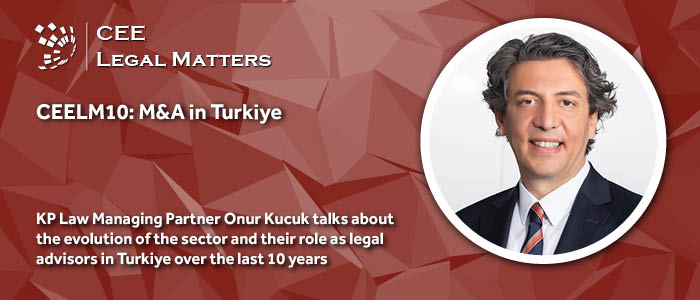KP Law Managing Partner Onur Kucuk talks about the evolution of the sector and their role as legal advisors in Turkiye over the last 10 years.
CEELM: Over the last 10 years, what types of projects have been keeping your M&A team busy?
Kucuk: Reflecting on the Turkish economy’s evolution over the past 10 years, the types of projects we encountered a decade ago were varied and numerous, attracting foreign investors from all countries. These projects ranged from exclusive Turkish deals to global ventures, without any distinct segmentation in the M&A sphere. Turkiye’s resilience during the 2008 financial crisis played a significant role in attracting investments – with a growing economy, high public and private spending, and strong government confidence, our country was an attractive investment destination. However, global changes have since directed investor focus toward market-infused targets, both locally and globally. The current trend leans toward strategic investors rather than private equity and venture capital ones, influenced by rising interest rates and the costlier global financial landscape. This shift is also reflective of the Turkish economy’s characteristics. Notably, foreign direct investments have somewhat diminished, and there’s a growing inclination toward technology and fintech projects. The emergence of unicorns in these sectors is a testament to the prowess of Turkish players in these markets – they’ve been doing a great job, overall.
CEELM: Looking back at the last 10 years, what were the highlights in terms of your team’s workload, and what do you believe led to them?
Kucuk: In the period between 2013 and 2016, we saw a surge in M&A deals and foreign investments. However, post-2018, there was a slowdown, influenced by changes in Turkish economic policies and a decline in foreign direct investment to approximately 10-20% of what it was a decade ago. The global economy, particularly the pandemic, also reshaped business practices. Government subsidies aimed at economic survival have now resulted in high inflation rates. To combat this, central banks adopted tighter monetary policies, reducing investment activities and affecting M&A deals. Turkiye’s experimentation with unorthodox economic policies, especially in managing inflation, didn’t yield the expected results. As of mid-2023, policy changes are underway, and we anticipate a revival in M&A activities and foreign investments. Throughout these fluctuations, industrial manufacturing M&A deals remained constant. Turkiye’s robust manufacturing and industrial facilities continue to attract strategic investors. The shift from predominantly EU and US investors to those from the UAE and former Soviet countries is also notable.
CEELM: What led to this change in investor dynamic? What is driving UAE investors to the market?
Kucuk: I think they see our country as a hub that enables entry into new markets, alongside the attractiveness of expanding operations to Turkiye. We have, in a way, always been an EU-adjacent lion of sorts. For example, we have a strong textile industry and are a strong agricultural player – these sectors are most attractive and could be considered a sort of honey pot.
On the other hand, Western investors’ decline in numbers is most likely more related to the internal economic policy shifts in their countries of origin than it has to do with Turkiye as such.
CEELM: What changes have you observed in client expectations and needs?
Kucuk: Two significant shifts are evident: the increasing importance of ESG issues and the growing prominence of technology. There’s heightened client interest in understanding the environmental impacts and compliance aspects of potential investments. Additionally, as technology becomes more integral to our lives, clients, especially in tech and fintech, expect legal advisors to have a grasp of both the legal and commercial aspects of their industries. Our clients wish to see us have the capacity to analyze and comment not just on the legal aspects of a deal but also on the commercial aspects of the industry as a whole. The focus of lawyers can no longer solely be local – it needs to incorporate other legislation on a specific matter, meaning that we need to develop a commercial sense to be able to at least comment on and compare foreign laws with local ones. This is most evident, for example, when it comes to understanding data privacy laws across different jurisdictions, necessitating a broader and more commercial approach to legal practice.
CEELM: From a legislative/regulatory perspective, what have been the main recurring challenges you have faced in making deals happen?
Kucuk: Regulatory challenges have not deterred deal-making. Our role involves structuring deals to comply with regulations without breaching laws, of course; yet despite various regulatory changes in Turkiye over the past decade, none have significantly deterred investors. Queries about capital movement regulations have increased, but they haven’t impeded investments.
CEELM: What lies on the horizon, and what do you believe will be the highlights in a similar interview a decade from now?
Kucuk: I predict a transformative shift in business practices, akin to an industrial revolution, over the next decade. This change will demand creativity for survival. In addition to technology’s continued influence, I think Turkiye will regain its position as a significant destination for foreign direct investment – much like it was a decade ago. Additionally, I am hopeful for the resolution of current geopolitical conflicts.
KP Law is CEE Legal Matters' Practice Leader for Corporate/M&A in Turkiye for 2024 – learn more here.
This article was originally published in Issue 10.11 of the CEE Legal Matters Magazine. If you would like to receive a hard copy of the magazine, you can subscribe here.






















